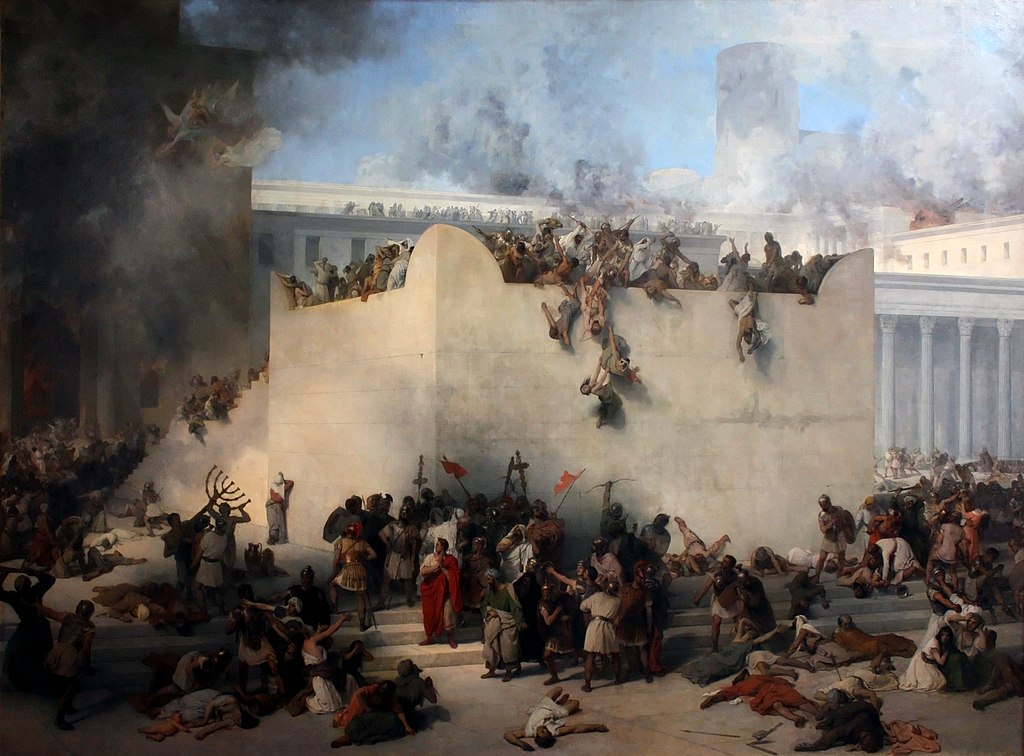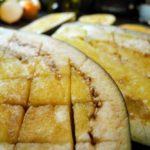Tisha B’Av History
The Tisha B’Av History by Deanna Amar Pool

Tisha B’Av is an annual fast day in Judaism, on which a number of disasters in Jewish history occurred, primarily the destruction of both Solomon’s Temple by the Neo-Babylonian Empire (586 BCE) and the Second Temple by the Roman Empire (70 CE) in Jerusalem.
The Sages have said: “Five events occurred to our fathers on the ninth of Av:
“It was decreed that the generation–of-the-wilderness should not enter the Land of Israel, as it is written , “Not a man of these men , of this evil generation, will see the land.”
- The first sanctuary was destroyed.
- The second sanctuary was destroyed.
- Beitar was captured.
- Jerusalem was plowed through after the Destruction, as it is written: “Zion shall be plowed like a field.”
- Another calamity was the expulsion of the Jews of Spain.
THE GENERATION-OF-THE-WILDERNESS
On the eight of Av, after spying on the Land of Israel for forty days, the twelve spies chosen from among the best of their tribes returned to the people .They spoke of the land as one that ”devours its inhabitants,” where men are giants and where even the produce of the land is out of the ordinary, witness the bunch of grapes that it took two men to carry it. Upon hearing their report the people became scared and cried out in anguish all night. On Tish’a B’av, angered by their lack of faith in His Providence God decreed that since “You wept without reason, I will fix for you a weeping for generations,” and all males between the ages of 20 and 60 will die in the Wilderness.
Despondent to hear they will not see the Promised Land and that they will die in the wilderness Korah incited the princes and the mighty to rebel against Moses and Aharon. The earth swallowed Korah, and 14,000 people perished in the uprising.
On the 17th of Elul, forty days after they slandered the land all the spies died with the exception of Joshua and Caleb who exhorted the people to have faith in God.
THE FIRST SANCTUARY WAS DESTROYED
“For eighteen years a Bat Kol or Voice from Heaven voice sounded in Nebuchanetzar’s palace: ”Wicked servant! Go up and destroy the House-of-Your-Master, since His sons do not obey Him.” But Nebuchanetzar refused to obey lest he be defeated by the Jews as his grandfather Sanncheriv. Instead, he sent Nevuzaradan, the chief butcher to destroy Jerusalem. He laid siege to the city for three and a half years without success. He wanted to turn back but God put it in his heart to measure the height of the wall. He began to measure the wall and found that each day the wall sank into the ground at a rate of two and a half tefachim (handbreadths) till it sank entirely. When it had sunk completely, the enemies entered Jerusalem” where they faced fierce resistance
On Tish’a B’Av they finally reached the Sanctuary. Tearing apart the parochet or curtains that separated the Holy of Holies from the rest of the sanctuary, they found the Holy Ark containing the Tablets of the Ten Commandments. The gold Cherubim or angels that adorned its cover and stood at each end of the Holy Ark, wings extended upward, had miraculously reached out to one another and forehead to forehead embraced each other, their wings enfolding them.
King Tzidkiyahu and his sons were taken prisoners by Nevuzaradan as they tried to flee to Jericho. He sent them to Nevuchanetzar who asked:” By what law shall I judge you?” Tzidkiyahu replied: “Slay me first so that I might not see the blood of my sons.”
His sons requested: ” Slay us first, so that we might not see the blood of our father.” Nevuchanetzar slew Tzidkiyahu’s sons before him, then gouged out his eyes which he threw in an oven.
Jeremiah is the prophet who foretold all these calamities to the King and Israel. He followed his people into exile and then returned to Jerusalem to console the remnant of Israel.. His Book of Lamentations or Kinnot, written in acrostic form, is an eyewitness account of the devastation of the Land, of the sufferings of the people dying of hunger and thirst, walking a trail of blood and tears. Kinnot are chanted in a mournful tune by the congregants who are seated on the floor.
DESTRUCTION OF THE SECOND TEMPLE
Judea had been a thorn in the side of the Roman Empire for many years. Governors and military men were sent there to quell the numerous uprisings but met with limited success. When Vespasian returned to Rome after a triumphal campaign in England, he was the natural choice of the Roman Senate which dispatched him to the Holy Land. He laid siege to Jerusalem for three years finally conquering it.
In the mean time Rome torn by civil war and unrest successively elected three emperors in three years. Although it professed to be a democracy, military power seemed to be the only solution, and Vespasian was summoned to come back at once. He named his son Titus as his replacement. After fierce battles Titus finally entered the Sanctuary. Taking a” prostitute by the hand, he entered the Holy of Holies, spread out a scroll of the Torah and committed a sin upon it.”
Gathering all the utensils of the Sanctuary in the Parochet or curtain he set sails for Rome.
“An Echo-of-a-Voice or Bat Kol said to him:” Wicked one! I have a tiny creature in My world which is called a fly. Go up to the dry ground and wage war with her.”
When he arrived in Rome, he was greeted with honors and praise by his compatriots, and as he reveled in his triumph a fly entered his nose and bored in his brain for seven years.
When he died, they opened his brain and found in it the likeness of a bird. At the time of his death, Titus issued an order to scatter his ashes over the seven seas, so that the God of the Jews should not find me and subject me to judgement .”
THE FALL OF BEITAR
Although Jerusalem had been destroyed and salt poured over its razed foundations, Israel continued to defy Rome. In the city of Betar a soldier by the name of Bar Koziba challenged the men who wanted to join his army to sever their own finger. 200,000 men severed their fingers. When the rabbis reproached him to make cripples out of the men he asked. ” How then shall they be tested”. They replied: “ Whoever cannot uproot a cedar from Lebanon while riding on his horse shall not be enrolled in your army”. 200,000 men passed the test. Superior in strength and numbers, Bar Koziba’s men inflicted heavy losses upon the 80,000 horn blowers (officers) surrounding Betar.
A legend was born. When rabbi Akiva saw him he said: “ A star has darted out of Jacob. Koziba has darted out of Jacob –he is the Messiah. He shall be known as Bar Kokhba( son of the star).
Hadrian laid siege to Betar for three and a half years, and Betar was still defiant.
One day a Kutite came to him and said: “As long as Rabbi Elazar Hamodai , this rooster wallows in ashes, you cannot conquer Betar. Wait for me and I shall enable you to conquer it today.”
He entered Beitar and found rabbi Elazar praying. Approaching him he pretended to whisper in his ear. People thinking that Rabbi Elazar was plotting against Bar Koziba went to inform him that he had been talking to a Kutite. Bar Koziba summoned him at once: “what were you whispering in my uncle’s ear.” The Kutite answered: “Should I tell you, Hadrian will put me to death and should I not tell you, you will put me to death. Better that I should take my own life.”
Bar Koziba sent for his uncle and asked: “What did the Kutite whisper in your ear?”
Rabbi Elazar replied: “ I could not hear what he said as I was praying.”
Furious Bar Koziba kicked once and killed him.
An Echo-of-a-Voice said to him: “You broke the arm of Israel. Therefore your arm shall become dry and your right eye shall become dim.”
Betar fell on the 9th of Av and Bar Koziba was slain.
They brought his head to Hadrian who asked to see his body. They found a snake wrapped around his neck. Hadrian said :’Were it not that God killed him, who could have killed him?”
The Romans entered Betar , and the blood flowed till their horses waded in it. Hadrian forbade that they be buried and ordered that their piled corpses be used as a fence for his vineyard . It was not until a new king arose seven years later that they were finally buried on the 15th of Av. Miraculously their bodies did not decompose.
THE EXPULSION FROM SPAIN
In February 1492 (1st of Adar 5252) Ferdinand of Aragon decreed that the Jews must leave Spain within three months “which are to begin on the 1st of May and are to end on the last of July”. Don Isaac Abarbanel an influential Jew who was the financier and counselor of the Kings of Spain wrote : ‘It turned out that the day set for the departure of the Jews from Spain was the 9th of Av. But the king did not know the character of the day when he issued his edict. It was as if he had had been led from above to fix this time”.
Three hundred thousand Jews left Spain rather than convert. Their torment had only begun. Pirates attacked their boats, capturing them to sell them as slaves; very often the captains they had entrusted with their lives would betray them, throwing them overboard or leaving them stranded in isolated lands.
Only the sultan of Turkey had mercy on them. Aware of the wealth of talent and knowledge they represented he sent a flotilla to rescue them, unfortunately many of the boats capsized in heavy seas. The Jews who made it to Morocco were welcomed back to the land they had left in 711.
AN AMAR FAMILY TRADITION
At Tish’a B’Av Moroccan Jewish families were split into two camps; the “Treyen” and the “Khanzin”, two Arabic adjectives in the masculine plural form respectively meaning the “pure” and the “impure”.
According to our Sages the besieged population of Jerusalem suffered from famine and thirst. Many resorted to eating the decaying carcasses they found hence their name “khanzin” meaning putrefied rendering them ritually impure.
On the other hand, there were others who were able to find ritually fit animals which they slaughtered for consumption in honor of Shabbat. We were part of this latter group.
As for the “Khanzin” the meat they ate on Shabbat was called “Khleh”. It consisted of chunks of meat which they fried and preserved in olive oil and stored in clay jars. Something akin to our khaw khawa. Being “treyen” elicited admiration and respect in the Jewish community. It spoke of our determination to remain loyal to the Torah tenets even in the extreme circumstance of war and famine.
A midrash that I loved to hear as if for the first time:
After the destruction of the first Temple, Abraham appeared before God asking: “Lord of the Universe! Why did you destroy the Sanctuary; at which place I brought up my son Isaac as an offering before you?”
God said to Abraham: “Your sons have sinned and they have violated the entire Torah including its twenty-two letters.”
Abraham said before God: ”Lord of the Universe, who bears witness that Israel has violated Your Torah?”
God answered: ”Let the Torah come and bear witness against Israel.”
Immediately, the Torah came to bear witness. Abraham said to her: “My daughter, remember the day when God turned you from nation to nation, and they all refused to accept you, till my sons came to Mt. Sinai, and they received you and honored you. And now, you come to bear witness against them on the day of their travail?” When the Torah heard this she stood to one side and did not testify against them.
God said to Abraham: “Let the twenty-two letters come and testify against Israel”. Immediately the twenty-two letters came. The Aleph came and testified that Israel had violated the Torah. Abraham said to her: “Aleph! You are the first of the letters and you have come to testify against Israel on their day of travail? Remember the day when God was revealed on Mt. Sinai and He began with you: “Anochi Hashem Elokeha” (I am the Lord Your God”) and no people accepted you other than my sons? Immediately the Aleph stood aside and did not testify against them.
The Bet came to testify against Israel. And Abraham said to her: “My daughter, you come to testify against my sons who diligently study the Five Books of the Torah, whose first letter you are, Bereshit bara Elokim?(“In the beginning God created”). Immediately the Bet stood to one side and did not bear witness.
When the other letters saw that Abraham had silenced them, they were shamed and stood aside and did not testify against Israel.(from the Book of our Heritage by Eliyahu Kitov)
When Tisha B’Av Falls on Sunday
When Tish’a B’Av falls on Sunday, we must start fasting after Havdalah. Due to this special occurrence the service of Havdalah is altered.
A Brief Synopsis of the Laws and Customs of Tisha B’Av that begins on Saturday Night
The final meal before the fast is called Seudah HaMafseket. Generally we are only allowed to eat one cooked food at this meal, usually rice and lentils or a hard boiled egg and a piece of bread. Since this year this meal will be on Shabbat itself, we are not to display any of these mourning signs at all. One is to eat a complete meal at the dining room table and we are even permitted to eat meat and drink wine and even make the meal large and festive similar to the feast that King Solomon would have when he reigned.
As we know, we are not permitted to wear leather shoes on Tish’ah BeAb. What are we to do since Shabbat ends and Tisha B’Av begins?
Generally we would change footwear at sunset but because of Shabbat we wait and do not remove our leather shoes until after Set HaKokhabim (the stars come out). At that point we remove our leather shoes and put on non-leather shoes and we change into non-Shabbat clothing. At that point Shabbat is definitely over and you can even drive to kenis to pray arbit and read Eikhah and qinot.
We do not make regular havdalah on Saturday night. We just say Atah Honantanou in the Amidah. Then after the Amidah we just light the candle and say the Berakhah of Bore Meore HaEsh. We do not say Hagefen, we do not say Besamim, we do not say Hamavdil.
On Sunday night when the fast is over then we take a cup of wine and say Bore Peri HaGefen and Hamavdil, but no Besamim.
Those people who are permitted to eat on Tisha B’Av (such as a woman who has given birth within 30 days of the fast) must make havdalah on a cup of wine before eating.
When the fast is over, you wash your hands. The ONLY BRAKHA is over the wine and you complete Havdalah with the singing of Hamavdil.
The first Shabbat after the 9th of Av is called Shabbat Nahamu after the first words of the Haftarah “Nahamu, nahamu ami… Console, console my people.”
It is the first of the Seven Haftarot of Consolation which are all excerpted from the writings of the Prophet Isaiah. These Haftarot contain 144 verses of consolation which offset the 143 verses of admonition of the Torah.
THE 15TH OF AV
Several events occurred on that day.
Death ceased for the generation-of-the-wilderness.
Repeal of the ban against intermarriage with the tribe of Benjamin.
The 15th of Av is like Yom Kippur.
The day on which Hosea ben Elah removed the roadblocks.
The day on which cutting of wood for the Altar ceased.
The slain of Betar.
Death ceased for the generation-of-the-wilderness
Every year since the report of the Spies, approximately 15,000 men between the ages of 20 and 60 would die on the9th of Av. On Erev Tish’a B’Av they would dig their graves and lay in them. In the morning the survivors would bury those who had died and so it went on for 39 years. On the 40th year as usual the men dug their graves anticipating their deaths. But in the morrow none had died. Fearing the Elders had made a mistake in their calculations relative to the 9th of Av, that night they went to sleep in their graves. In the morrow , none had died. They repeated the ritual until one night the full moon appeared to them. It was the 15th of Av. They understood then that no mistake had been made; they had been given a reprieve by God and they celebrated the gift of their lives.
Repeal of the ban
On their way home a Levite, his concubine and their servant arrived in Give’a a town that belonged to the tribe of Benjamin. There an old man offered them the hospitality of his home. After partaking of the meal their host graciously set before them they were ready to go to bed. The silence of the night was shattered by loud banging on the door. A crowd had formed outside the house demanding that the host hand over his male guest “that they may know him”. The host refused to let them commit such an abomination and offered instead to give them his virgin daughter as well as the man’s concubine. The concubine was taken out of the house and given to the crowd that dishonored her. The following morning the Levite gathered his concubine and servant and went home. There He dismembered his wife into 12 parts which he sent to every tribe. Appalled by the actions of the Benjamines the 11 tribes banished the tribe, vowing not to give any of their daughters to their sons. The ban was eventually lifted and it happened on the 15th of Av.
15th of Av equal to Yom Kippur
By sparing the lives of the 15,000 men doomed to die in the Wilderness God showed them forgiveness and compassion as He does at Yom Kipur.
Hosea
Yeroboam, king of Israel forbade his people to worship at the Temple of Jerusalem. To achieve his goal he built roadblocks and erected two gold calves for them to worship. Three hundred years later, king Hosea removed the roadblocks and allowed the people to resume the pilgrimage to Jerusalem.
Cutting the wood of the altar
The 15th of Av was the last day when cutting wood for the altar was allowed. After that no wood could be brought to the Temple as it was feared that the wood may not cure properly and worms might infect it, rendering it unfit to be used on the altar
Slain of Betar
Hadrian or Adrianus fenced in his immense vineyard with the corpses of the Jews he massacred at the fall of Betar. Miraculously, say the rabbis, the corpses did not decompose and on the 15th of Av they were given proper burial.
ELUL
When Moses descended from Mount Sinai and saw the Hebrews celebrating around the Golden Calf he broke the Tablets of the Law and he and the tribe of Levi slew the idolaters. He ordered the people to melt the idol, grind it into dust which was then mixed with the drinking water and forced the Hebrews to drink of that mixture. He ascended once more the mountain to plead for God’s forgiveness which was granted to the people of Israel. On Rosh Hodesh Elul Moses went up Mount Sinai with the second set of Tablets and remained there forty days and forty nights, descending from the mountain on it is a month Yom Kippur.
Since it is during the month Elul that God reconciled with His people and forgave its apostasy, the rabbis therefore enjoin us to look into ourselves and purify our souls in anticipation of the Day of Judgement.
Penitential prayers or Selihot {from the root word selah meaning forgive} are recited every day. From the second day of Rosh Hodesh Elul until the eve of Rosh Hashana the four sounds of the shofar are blown once in remembrance of our ancestors for whom the shofar was blown daily to warn them not to err again. The shofar call to repentance of yesteryear stirs us still today
To underline the importance of the recitation of Selihot the rabbis make the following analogy. A poor man was once invited to the King’s palace. His joy was mitigated with sorrow as he did not have any garment to wear but the one on his back. So he washed it carefully, and finding it still unworthy of his host, he washed it again and again until satisfied that no spot could be found he felt ready to go see the King. Such is the purpose of Selihot, a cleansing process to enable us to come closer to God.
A Family Story
AN AMAR FAMILY TRADITION
During the month of Elul all the children of our neighborhood practiced blowing the shofar. Some because they were going to blow it at Rosh Hashana and Yom Kippur services and most of us just for the fun of it. My father who usually conducted the High Holidays Services at his Grandfather Baba Messod’s synagogue would practice as well.
He would pull out of his armoire the shofar which was carefully wrapped in soft cloth and lay it on top of the dining-room sideboard. We were of course told not to touch it, but who could resist its soft patina and mystery? I would take it and blow discordant sounds out of it to the reprobation of my mother and grandmother in whose eyes my action had been one of defilement that had to be reported to my father. Sometimes to appease his mother, I was punished for my infraction. Perhaps weary of my determination to blow the shofar, one year, he brought home several ram’s horns and announced that we were going to make our own shofar. We recoiled at the sight of that strange object that clearly evoked its origins. Enthusiastically my mother took the horns from my father and put them in a large pot of boiling water. We watched her scoop with a large ladle the foam that would raise to the edge of the pot, and as only a mother knows, after a while she declared them done. One at a time she pulled the horns out of the water and with a knife scraped out some matter attached to the inner wall.
She then cut off the narrow end forming the mouthpiece and lifting the horn to the light she cleaned its innards once more. She returned it to the water, and after a while took it out, shaped it in a graceful curve and let it to dry. Ignoring the roiling water and the stench she fashioned a shofar for each one of us.
It was the last time I touched my father’s shofar and for that matter any shofar.
Tisha B’Av Recipes
See all our traditional family recipes for breaking the fast of Tisha B’Av here.





